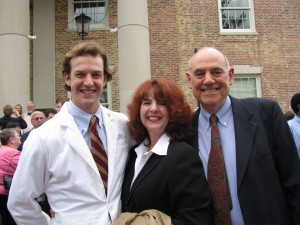
Dr. Stan Wetschler '63 (far right) with his wife Jayne, and son, Matt (left), at University of North Carolina medical school.
By Kate Helm
Diagnosed in 1999 with stage-four colon cancer, Dr. Stan Wetschler ’63 found himself in the vulnerable role of patient. He embarked on a journey that he would never have imagined for himself.
“Immediately after my colonoscopy, my gastroenterologist said something I will never forget as long as I live,” recalls Wetschler, of Bradfordwoods, Pa. “He said, ‘I have another patient who has exactly what you have and is alive after five years. There is no reason why you can’t be just like him.'”
Although the doctor was aware of how small, statistically, the chances of survival were for Wetschler, his comments were affirmative. “They were powerful words,” says Wetschler, “I used them as a focal point, from which I never veered.”
His second oncologist sat 10 feet away from him, threw two studies at him, and said they would most likely give him an additional two months. He further explained that the side effects could be significant. Wetschler said, “No thank you.”
When Wetschler saw the second oncologist at a social function in 2005, he said: “Do you know who I am?” When the doctor said he did not recognize him, Wetschler told him his story, and he was quite mute. Days later, Wetschler received a call from Devra Davis, an epidemiologist and nationally known figure in public health and environmental oncology.
Davis wanted to know what Wetschler had done to Dr. R, exclaiming that Wetschler “blew his mind! As I recall, he was visibly shaken as he saw me standing before him four years after he had pronounced my death sentence in so many words.”
Wetschler’s wife, Jayne, enjoyed reading books on holistic medicine. Not wanting to hurt her feelings by saying what he really thought — that those methods were nonsense — her physician husband had politely dismissed them as “irrelevant” before his personal encounter with cancer.
Wetschler did undergo an operative tumor resection and chemotherapy after the initial diagnosis. Then in 2001, multiple metastatic lesions were discovered in his lungs.
He employed an array of alternative and complementary treatments. These included prayer, meditation, visualization, herbs and supplements, massage, reflexology, support groups, a raw vegetarian diet, and the Ann Wigmore Program which includes consuming wheat grass juice and sprouts. After the Wigmore program, one of the pulmonary tumors had decreased in size and “my C.E.A. value decreased so I opted for surgery to remove the lung tumors, sensing that the tumor biology had been significantly altered, and a cure would be possible,” says Wetschler.
Eleven years after the original tumor was found, Wetschler says he is doing well. The former director of the Dean Ornish Program in Pittsburgh, he is retired from his internal medicine practice. Wetschler says his goal now is to develop a program for doctors who have been diagnosed with cancer. He explains patients would be introduced to new thought processes regarding how they can be empowered to alter the quality of their lives while living with cancer. He says the program would include evidence-based modalities in the field of energy medicine, such as acupuncture, nutrition, imagery, and prayer.
One of Wetschler’s most memorable treatments included a modified Native American vision quest suggested by Lewis Mehl-Madrona, then medical director of complementary medicine at University of Pittsburgh Medical Center and of Cherokee-Lakota descent. He told Wetschler he would have to discover his own healing journey. So, Wetschler completed sessions with a behaviorist, acupuncturist, nutritionist, and herbalist, drank Essiac tea, and listened to Native American tales of eagles, wolves, and bears while in a trance.
“I lived in an apartment through the ‘intensiva,’ a metaphor for being situated on a rock or near a cave in Arizona as part of the healing process, writing a journal about my life, and finally ending in a ceremony in Schenley Park in Pittsburgh with some poor family practice resident observing,” says Wetschler. The ceremony included chanting, prayers, purification with sage, and the burning of a cigar that was to be buried under a tree on his property afterwards.
Wetschler’s success using these unconventional methods has inspired him to help others. “As a retired physician, I spend my time counseling cancer patients and offering suggestions which they most likely would never hear in an allopathic clinical setting,” he says. “The reward of performing this service and observing the sense of gratitute and encouragement in those afflicted has been the most professionally fulfilling of anything I have ever done in my professional career.”
Wetschler invites anyone with a similiar a health concern to contact him (swetschler@hotmail.com).
